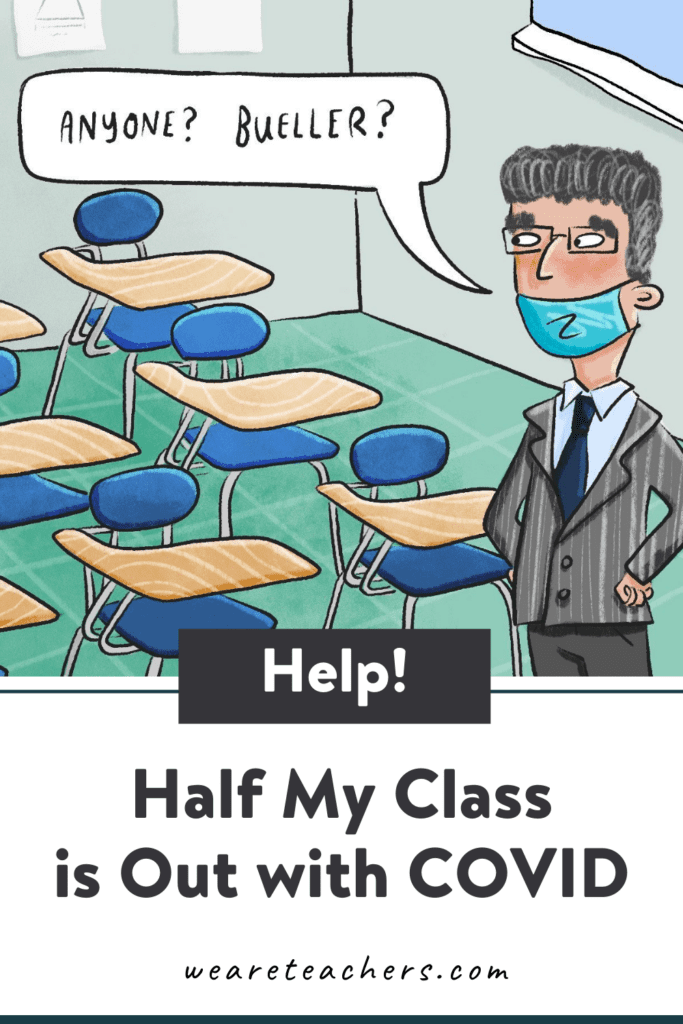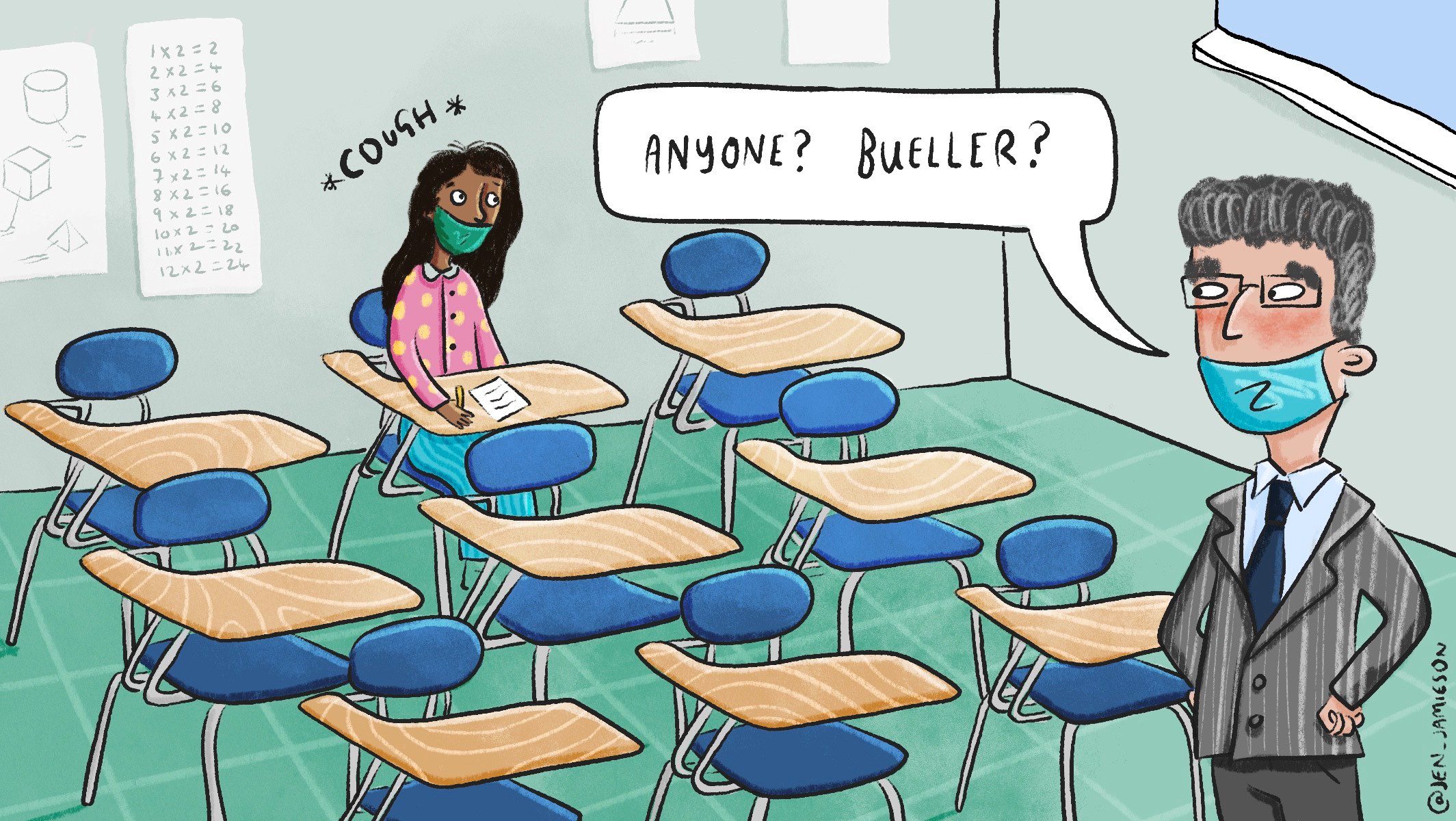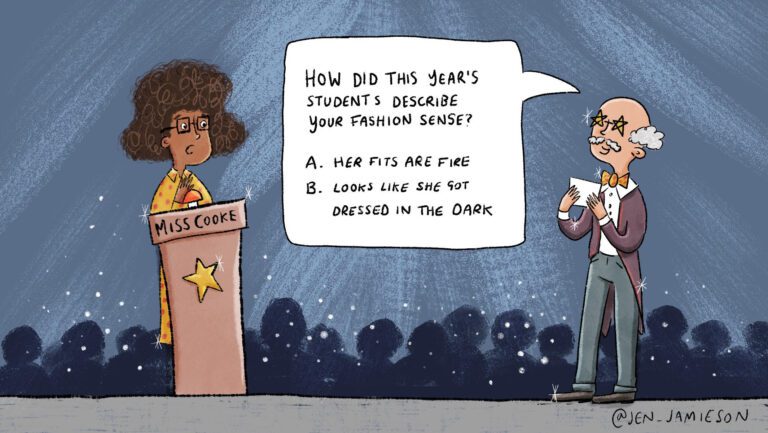Dear We Are Teachers:
I’ve been teaching third grade for 12 years. You’d think I’d know what I was doing by now. But nothing could have prepared me for coming back from break and having literally half my class out with COVID. I really don’t want to go back to virtual learning. But these kids are going to be so far behind. And I don’t want to hold back the ones who’ve been in class the whole time. How am I supposed to plan with so much uncertainty? —In Limbo
Dear I.L.,
Educators all over the world are feeling like they are “in limbo,” too. There are heavy and hectic vibes pulsating through schools because of the extremes of teaching during these precarious times. Like you, many teachers, caregivers, and students dread more Zoom schooling. It can feel so discouraging to work so hard and feel like our learners aren’t having the success we know they could. I’m sure you’ve heard the sentiment in these words from mathematician and professor John Allen Paulos: “Uncertainty is the only certainty there is, and knowing how to live with insecurity is the only security.” We all react to uncertainty differently, and some manage stress better than others.
The American Psychological Association describes how “daily tasks and decision-making have become more difficult during the pandemic, particularly for younger adults and parents. As each day can bring a new set of decisions about safety, security, growth, travel, work, and other life requirements, people in the United States seem to be increasingly wracked with uncertainty.” Often, I feel like I’m just barely treading water because of the uncertainties during the pandemic. Sometimes, I feel like I’ve been churned up by the waves; other times, I get a breather with a long walk on the shore at low tide. The thing is: everything ebbs and flows.
So, what can we do to feel safe, take care of our well-being, and support our students and families? We will never be able to avoid the unexpected things in life, but we CAN control how we react to them. Here are a few ideas to help cope with uncertainty . They may sound simple, but for most of us, they are hard to do consistently.
Managing uncertainty begins with acceptance. The pandemic has created a lot of disruption in our personal and professional lives, and we just need to meet life where it is and do the next best thing. Try talking to yourself like you would talk to a friend. Extend the same grace, patience, and compassion to YOU. Consider what actually is in your control and what is not. It might help to jot down ideas and try and live within your sphere of control. Keep up some healthy routines. If you need a reboot, a good place to start is to reflect on what your morning routine looks and feels like. Try waking up 10 minutes earlier to squeeze in something that nurtures and inspires you to promote a sense of calm and ease. I like to read a poem, passage, or song lyrics and write about what resonates with me.
The Greater Good Science Center suggests “the opposite of uncertainty is not a certainty; it’s presence. Instead of imagining a scary and unknown future, we can bring our attention to our breath. From there, we can check in with ourselves.” Planning with uncertainty in mind is the life of a teacher. What we all need to work on is showing up, being present, and being aware of how we react to our life circumstances.
Here’s an offering from Young People’s Poet Laureate (2019-2021) Naomi Shihab Nye:
Slowly slow…
You aren’t living the whole
thing
At once
That’s what a minute said to
an hour
Without me you are nothing
Dear WeAreTeachers:
I’m young, recently graduated with my teaching degree, and subbing in my local district. I’ve subbed in this one high school a bunch of times. Teachers are starting to request me. It feels good to be coming to the same school site again and again. I’m feeling more a part of their community. Until this happened. I was covering for the math teacher who was quarantining, and I put my head down on my desk for a second to massage my neck. Well, a student took a picture of it and sent it to the office. I wasn’t even sleeping! I’d like to get a full-time job, and I don’t want this to ruin my career. How can I do some damage control?— It’s Not What It Seems
Dear I.N.W.I.S.,
You are a human being living a real and imperfect life. I hope you aren’t beating yourself up over this. Being photographed or recorded without permission is a teacher’s nightmare! I can totally imagine this playing out in the classroom. Ugh! It’s troubling how one brief moment of rest can be construed as a problem.
As far as damage control, I recommend taking the initiative and asking to meet with the site leadership to share what happened. Be honest! Acknowledge that from the outside, it appears that you were sleeping, but that you just took a moment to massage your neck and then refocused immediately. You can share that you feel misrepresented. Try saying something like, “I want to be proactive about an issue that just happened. I was working with students and felt overwhelmed, so I paused and took a couple of deep breaths. While I had my hands to my head, a student snapped some photos of me. I love being a part of this school community, and I hope this does not jeopardize any future work opportunities.” Reassure the administrator that you have had a lot of good feedback from various staff members. Maybe even share that you have teachers requesting you.
If you are going to continue working at the site, consider asking to meet with the principal and student who took pictures of you to address what happened. Be ready to share how the photo does not accurately portray the kind of teacher you are. Let the student know how this photo has deeply affected you and your work opportunities. It’s important to let students know how their actions impact others. In the future, it would be helpful to get to know the office staff so that if you did need to step out of the classroom, you could get covered and then pull yourself together and join the classroom community again after a brief break.
It seems common nowadays for students to video record without permission. And to be honest, in many cases, the students have captured something that is just wrong and needs to be uncovered and addressed. For example, it’s likely that you have seen the video of the teacher from Riverside, CA, who put on a fake headdress in her high school math class. Although it’s uncomfortable to watch the video, it is promoting some important conversations about how harmful the teachers’ actions were to Indigenous people.
Hopefully, your talk with the administration team will go well, and your work will flourish. If, for some reason, things remain bumpy, consider a fresh beginning in another district and include the classroom teachers who requested you as a reference. Sending you compassion and support!
Dear WeAreTeachers:
Yesterday, one of my kindergarteners needed some assistance. He has been acting out lately and throwing things. His parents are in the thick of a separation, and he has also been acting out at home. When I felt like I ran out of ideas to help this student, I called our district behavior team to get some support. They came down and observed the student and then gathered up my students on the rug. Guess what they promised my class? They had a grand idea to offer my Title 1 kinder class free pizza if they ALL behaved well. I thought it was pretty inappropriate to be offering food contingent on behavior to a community with food insecurity. Also, how is one kid’s behavior the responsibility of the others? Is it just me, or does this behavior team need a behavioral adjustment? —Baffled by the Behavior Team
Dear B.B.T.B.T.,
Ummm. Just wow. I know you were seeking insight and professional advice for a challenging situation with a student, and this really feels off the mark. Unfortunately, the behavior team didn’t consult with you before offering the pizza party incentive. The communication breakdown must feel super frustrating, and now you are stuck figuring out a system to earn the pizza reward. Additionally, you still need to address the student who has been acting out. The food insecurity issue is real, and it sounds like offering food as a reward can have some unintended consequences. And to top it all off, you may have a pizza party mess in your future.
When we think of classroom behavior, it’s helpful to consider the different effects of intrinsic and extrinsic rewards. “Intrinsic motivation is doing something for the sake of personal satisfaction. The primary motivator is internal (i.e., you don’t expect to get anything in return). You are intrinsically motivated when you do something simply because it makes you feel good, is personally challenging, and/or leads to a sense of accomplishment.” On the other hand, “Extrinsic motivation is doing something to earn a reward or to avoid punishment. The primary motivator is external (i.e., you expect to get something for completing a certain task, or you want to avoid a consequence for not doing something).”
So, what do you want to take root in your classroom culture? I’m confident that in the long run, we share the desire to foster a sense of internal motivation where students don’t expect things in return. And yet, there are times when we are shaping some immediate and challenging behaviors that a combination of intrinsic and extrinsic motivation might be a way to capture student attention and improve behavioral norms. No matter what approach you take, providing very specific feedback is key. For example, “Juan, I noticed that this time when you lined up, you walked and respected other peoples’ space. Great job of sticking with your goal to line up with self-control and awareness for others. Let’s keep it up for the line after lunch.”
So, how can you move forward and make this situation a learning opportunity? I recommend meeting one-on-one with the student and setting daily goals together. Involving the student in self-reflection is important. This will help build self-awareness, self-regulation, and relationship skills. Noticing and naming is a simple yet deeply powerful technique for teachers to help students approximate the desired behaviors. And be sure to include heaps of intentional, descriptive teacher language to build clarity of purpose, progress monitoring, and a positive classroom community.
Lastly, you can put the kibosh on the pizza party idea. Listen to your gut. Your kids will get over it.
Dear WeAreTeachers:
There are a couple of teachers at my school who are obviously into each other, and they recently became romantically involved. The dating scene hasn’t exactly been working out for me, and I may be a little jealous. The thing is, I notice them touching when they think no one is looking in the teacher workroom, hallways, and the parking lot. It makes me really uncomfortable. Is this a me issue or a them issue?
Want more advice? Visit our Ask WeAreTeachers hub.
Illustration: Jennifer Jamieson


